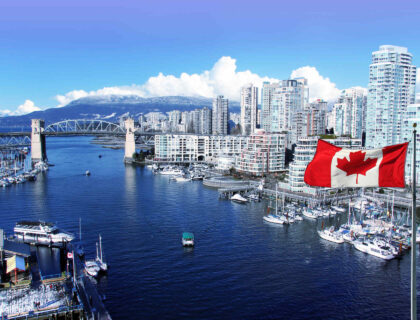

Relocating to a foreign country can be quite scary and complicated at first thought. You’ll have to meet new people, get familiar with their customs and traditions and even the smallest tasks such as going shopping or taking the bus can be challenging. If you’re moving to Scotland, we made a list of things to know about relocation to this beautiful land.
1. Moving to Scotland as a US Citizen
Moving out of the country will be hectic, from finding an appropriate home to choosing the right international moving services, organizing your budgets and packing your possessions, getting all the papers, and taking many more steps before your overseas relocation. So don’t forget the most crucial one – your visa application!
Depending on your circumstances and whether you’re moving to live, study, or work, you’ll have to apply for an appropriate visa. While there are many different options, you will find the proper information about your application by contacting the British Embassy in Washington or any other British consulate close to your home. Let’s take a closer look at the most common visas.
1. Work Visa (General Visa)
If you’re moving after you have already found and secured a job through, let’s say, an online interview, you will be applying for a working visa. Most likely, your employer will help you in this process as he will be your sponsor. Besides sponsoring you, your employer might also have to complete the Resident Labour Market test, proving that no other person in the European Economic Area has the same skills as yours, as EU expats have priority in this department.
2. Student Visa
If you want to experience studying in Scotland, you will have to apply for an international student visa. Usually, before you move, you need to secure a place at a university or school, such as the University of Edinburgh or other licensed education institutions. For more information, you can visit the Study In Scotland site. Recently, the British Office has released a Fact Sheet to provide details on the new Graduate Immigration Route that will start in 2021. This route will give you the option of staying two additional years after you complete your studies.
Want to Bring Your Family Along?
If you’re planning to move for business or work and are worried about bringing your family, the process is simple. Your family members can apply for visas with you. However, you have to have proof that you’ll be able to support them financially and confirm that you will be staying together.

2. Job Options in Scotland
You’ll be happy to hear that Scotland gives opportunities in various career spheres such as healthcare, teaching and education, science, creative arts, and finance. Hopefully, you’ll find something that fits you and your line of work. If you need any further information about career options, just visit the Work in Scotland website. You can also check employment sites such as Reed and similar.

3. Where to Live in Scotland as an Expatriate
There is a difference between city and village life. Living in a village might make you feel the cultural differences more intensely, and you might at first have issues fitting in with the locals, especially if you’re moving abroad alone and planning to live by yourself. We suggest you look for your new home in bigger cities, for starters, such as Edinburgh, Dundee, and Glasgow. While city life can be noisy, these cities, like Edinburgh, have reliable transport, are very culturally diverse, and have a lot of quality schooling.

4. The Cost of Living in Scotland
If you’re planning to rent an apartment or house, especially in a larger city like Edinburgh, you should be aware that renting from private landlords is cheaper than renting from agencies. However, you should be careful as some owners rent illegally. If you opt for a private landlord, always ask to see the registration number. If you choose to use an agency, you’ll find many housing options on Lettingweb and similar online sites.
While the overall cost of living is somewhat identical to the one in the US, you should know that there are some additional taxes for local services such as garbage collection, schools, general city maintenance, even a TV tax. However, this depends on where you’re living and what type of accommodation you have. So no need to panic, just check with your landlord or agency beforehand.

5. Scottish NHS for Expats
The National Health Service is managed by the Scottish Government, and the NHS provision is paid through taxes. So if you’re employed or self-employed in Scotland, you are entitled to free health care. The same applies to all of your family members, no need to worry.
Students that are on the full-time courses also receive free health care. And even if you’re studying only part-time, you can still be eligible.

6. Fun Facts to Know About the Country
If you want to know more about living overseas in Scotland, here are some fun facts about what to expect when you arrive at your new home.
#1 Scotland’s Variety of Accents
While breaking a language barrier won’t be a problem, you might get a bit confused since, like in the UK, people in Scotland have various accents that depend on the geographic position and class. The choice of words, intonation, and pronunciation will give it away. Even in larger cities such as Edinburgh and Glasgow, you’ll hear a difference in accents. This variety is quite fascinating, and if you want to hear more about it, just check out this video.

#2 Enticing Scottish Landscapes
While you must have looked through images a million times before, nothing will compare to the real deal. From the highlands to the small islands, the natural landscapes are simply amazing. These large stretches of green lands are perfect for exploring. If you’re moving with dogs, the magnificent Scottish nature will be ideal for your canine friends.
If you want another reminder of what will await you, check out this video of the beautiful views.

#3 The Midges
One thing you need to prepare for before you arrive is midges. During midge season, it is impossible to avoid, so make sure to buy repellant, or you’ll be spending your days scratching and slapping your arms and legs.

7. Meeting the Scots
Depending on where you will live or travel once there, you’ll experience many different cultural aspects as Scots pride themselves in their heritage and traditions. Nonetheless, Scottish people are very open and welcoming and like to embrace trends and new cultures. Use this opportunity to get to know Scotland better by immersing yourself in culture and start a new exciting life. Scots will make you feel at home.
We hope our list of things to know about moving to Scotland helped you in your travel preparations. Best of luck with your international move.







